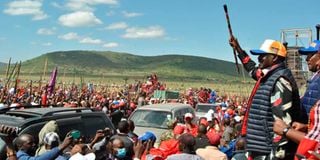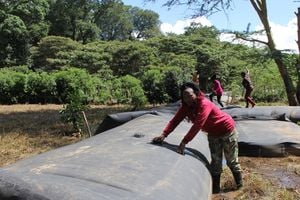Loading: Raila Odinga vs IEBC circa August 2022

Azimio la Umoja One Kenya Coalition party presidential candidate Mr Raila Odinga addresses a campaign rally in Aitong, Narok West Constituency.
Four time Raila Odinga contested a presidential election. Four times he has lost. Four times he has rejected results and threatened devastating protests in pursuit of ‘electoral justice’. Odinga has subjected every Kenyan president to these traumatic ordeals, except Jomo Kenyatta.
This might explain why Uhuru Kenyatta endured a double portion of Odinga’s blistering onslaughts. Each president against whom Odinga has grappled has had to fashion a form of political accommodation or ‘Handshake’, if you will.
Now Odinga’s implacable adherents hold it as an article of faith that Odinga’s electoral triumphs have invariably been purloined by his rivals. The double injustice of these perennial larcenies, according to them, consigns Odinga’s political constituencies to interminable disenfranchisement whilst serially constituting illegitimate governments. Only Odinga’s cooptation can mitigate these injustices.
At the earliest instance, therefore, Odinga is strategically conflated with his constituency and identified with a potent, transcendental cause that is never articulated with clarity, the better to keep motley partisans perpetually radicalised. Appeasing Odinga then becomes the principal means and the sole end of the struggle for justice on one hand, and stabilising government on the other.
Cottage industry
Over time, Odinga has become a cause in himself. He is the platform, agenda, manifesto, the means and the end of his political movement. This movement is buttressed by an ideological cottage industry which has converted the name and person of Odinga to a synonym for justice, freedom and democracy. Beyond quotidian symbolism and standard political iconography, Odinga’s effort projects his person as the embodiment of the ideals and values around which political movements typically mobilise.
This way, Odinga abstracts his political agenda from the standard imperative to canvass issues and interests that actually matter to constituencies, instead substituting it with an obsession with stylised biography and focus on apocryphal credentials.
In the Odinga political galaxy, mobilisation entails the fabrication of arbitrary binarities centred around what Odinga is, and what his competitors are not. This seductive simplification is utterly intoxicating: vote Odinga because he is Odinga, and reject others because they are not Odinga.
In an heroic age where history consisted in the exploits of exceptional men, Odinga’s cult of personality arguably made strategic sense. After all, tribal legends and mythical heroes were fashioned out of this mould. In the age of cosmopolitan polity, democracy and collective action, it is grossly and incurably maladroit. In far-flung political communities, tribal heroes are exposed for what they are: zero-sum parochial champions whose profile abroad is necessarily xenophobic.
Issue-based politics
The Constitution of Kenya systematically detribalised our politics, paving the way for inclusive, ‘issue-based, people-centred, result-oriented and accountable politics’. A cosmopolitan generation has come of age who were born in ‘a working nation’, who plug fluently into cross-cutting issue-based politics.
This is the reason BBI and its reconstitution of Kenya into an oligarchy of tribal champions and ethnic legends was universally repugnant. Azimio, as its electoral expression, inevitably struggles.
On the other hand, the appeal of the Hustler Nation and Kenya Kwanza’s self-consciously issue-based platform is therefore not a typical euphoria fuelled by underlying ethnic consensus mediated by tribal kingpins. It is rather the expression of a fundamental and irreversible shift in the national conversation , away from the focus on the personalities of ethnic chiefs and their tribal claims, to mobilisation around the democratisation of opportunity and making the economy work for all.
It is why Raila Odinga has been struggling. Disrobed of the mystique of ethnic mythologisation and biographical inventiveness, Odinga has no capacity to participate in the brave new world of Kenyan politics with any measure of proficiency. A naked king, he can can only stutter the absurd exclamations, ‘Tibim!’ and ‘Tialala!’ before perplexed gatherings.
His ethno-regional coalition enlisted the necessary quorum of tribal lords, but the popular constituencies did not budge. Odinga’s old strongholds have either defected entirely, or become chancy battlegrounds in the wake of an elemental Kenya Kwanza surge.
Odinga is no one’s fool. He can tell where the wind is blowing, and he is preparing to make the best out of the worst. Over the past month, Odinga’s campaign has engaged the IEBC in a campaign of complaints, plying the hapless commission with an interminable succession of importunate correspondence. This campaign has escalated to ultimatums, as Odinga’s language assumes its typically ominous flavour of ‘non-negotiable’ demands and ‘irreducible minimums’.
Azimio want manual registers. Azimio want to travel overseas to supervise the preparation of polling stationery. Azimio accuse Kenya Kwanza leaders of unbecoming fraternisations. Azimio have no confidence in poll officials at all levels.
Odinga’s campaign is frantically contriving a paper trail for what it intends to be a successful petition of the presidential election before the Supreme Court. In tactically anticipating the 2022 edition of Raila Odinga & Others vs IEBC & Others, Odinga has unequivocally conceded the forthcoming contest. And who can blame him?
Mr Ng’eno is an Advocate of the High Court of Kenya and a former State House speech writer. @EricNgeno





